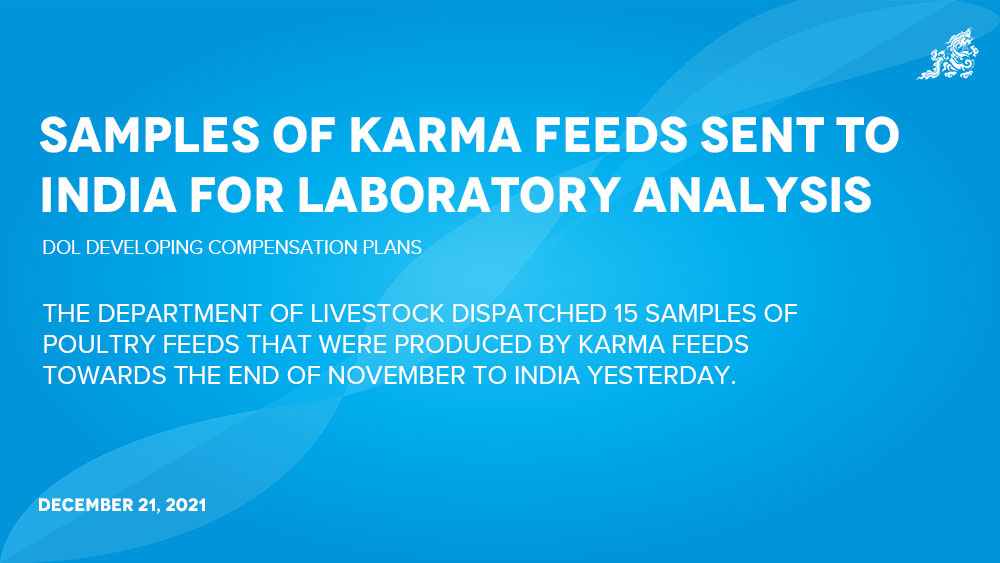DoL developing compensation plans
Nima | Gelephu
The Department of Livestock dispatched 15 samples of poultry feeds that were produced by Karma Feeds towards the end of November to India yesterday.
The department will also be sending samples from the same batch of feeds to Thailand for laboratory analysis today. The laboratory facility in the country could not detect the level of toxicity or contamination in the feeds that caused problems in poultry farms across the country.
Farmers complained of high mortality and reduced egg production after the poultry birds were given poultry feeds produced by Karma Feeds on November 24, 25, 27, 29, 30, and December 1.
Farmers from 16 dzongkhags and over 364,000 birds were affected, according to the record with the department.
Over 3,000 poultry birds died and close to 40 farmers from Sarpang were affected because of the feeds, according to records with Sarpang Layer Cooperative (SLC), the largest poultry farmers’ cooperative in Sarpang.
The head of the Disease Prevention and Control Unit at the National Centre for Animal Health, Dr. Sangay Rinchen said feeds would be tested for the presence of heavy metals, Aflatoxin, and other bacterial diseases, as the post mortem reports showed problems due to toxicity.
“There is a clear indication of toxicity, but we are not able to identify the agent. All diseases common to poultry farms in the country were ruled out. There could be other diseases that have not been reported in the country,” he said.
The official added that laboratory tests in the country can only confirm the presence of toxins in the feed samples, as the laboratory analysis would be qualitative.
The samples from Tsirang, Haa and Paro tested negative for Aflatoxin. The samples were tested again yesterday. However, the test conducted the in the country won’t be able to quantify the presence of aflatoxin, according to the official.
“It won’t be able to say the amount of toxins present in the feeds. The samples might show positive toxicity at a lower content but it doesn’t show the limit. That’s why we are going for a quantitative analysis,” said Sangay Rinchen.
The department also carried out assessments in Tsirang, Haa, and Paro.
The findings from the three dzongkhags would be representative of problems facing farmers in other affected dzongkhags, as farmers used the same batch of feeds, according to the official.
No incentives: Farmers
A farmer from Samtenthang, Samtenling, Namgay Wangchuk said the birds recovered after changing the feeds. However, the birds faced the same problem even after using fresh feeds from Karma Feeds.
“The feeds were recalled but there is no one talking about incentivizing the loss farmers faced. There were no government officials accompanying Karma Feeds officials collecting the details of the affected farmers,” he said.
He added most farmers started poultry farming with loans and repaying them would be difficult because of the current situation. “Feedback from the farmers was not well taken. Even if the problem was with raw materials, they should have checked it well to prevent all these problems,” said Namgay Wangchuk.
Farmers added that the feed company should at least compensate some percent of the loss. Almost all of the farmers have loans to repay. “We depend on the minimum profits. Incentivizing the loss could help us, but our feedback is not taken seriously. We are not expecting 100 percent compensation,” said the farmer.
The Department of Livestock is in the process of developing a compensation scheme for the affected farmers after the department’s meeting with the officials from Karma Feeds Company yesterday.
Karma Feeds’ director Chencho Wangyal said the company recalled over 540 metric tonnes of feed, as a precautionary measure. It purportedly cost over Nu 3 million while replacing and recalling the feeds produced towards the end of November.
He said that the company is awaiting the test results on the samples. “We cannot decide on the compensation, as the government has yet to understand the root cause,” said the director.
The official added that it was 99 percent sure the problem was because of a chemical toxicity, which is a problem at the source, with raw materials. There is no testing facility to test raw materials in the country, according to Chencho Wangyal.
He said the government would come up with the best judgment that would look into the interests of both farmers and company.


